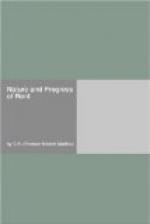Adam Smith, though in some parts of the eleventh chapter of his first book he contemplates rent quite in its true light,(1) and has interspersed through his work more just observations on the subject than any other writer, has not explained the most essential cause of the high price of raw produce with sufficient distinctness, though he often touches on it; and by applying occasionally the term monopoly to the rent of land, without stopping to mark its more radical peculiarities, he leaves the reader without a definite impression of the real difference between the cause of the high price of the necessaries of life, and of monopolized commodities.
Some of the views which the Economists have taken of the nature of rent appear to me, in like manner, to be quite just; but they have mixed them with so much error, and have drawn such preposterous and contradictory conclusions from them, that what is true in their doctrines, has been obscured and lost in the mass of superincumbent error, and has in consequence produced little effect. Their great practical conclusion, namely, the propriety of taxing exclusively the net rents of the landlords, evidently depends upon their considering these rents as completely disposable, like that excess of price above the cost of production which distinguishes a common monopoly.
M. Say, in his valuable treatise on political economy, in which he has explained with great clearness many points which have not been sufficiently developed by Adam Smith, has not treated the subject of rent in a manner entirely satisfactory. In speaking of the different natural agents which, as well as the land, co-operate with the labours of man, he observes, ’Heureusement personne n’a pu dire le vent et le soleil m’appartiennent, et le service qu’ils rendent doit m’etre paye.’(2) And, though he acknowledges that, for obvious reasons, property in land is necessary, yet he evidently considers rent as almost exclusively owing to such appropriation, and to external demand.
In the excellent work of M. de Sismondi, De la richesse commerciale, he says in a note on the subject of rent, ’Cette partie de la rente fonciere est celle que les Economistes ont decoree du nom du produit net comme etant le seul fruit du travail qui aj outat quelquechose a la richesse nationale. On pourrait au contraire soutenir contre eux, que c’est la seule partie du produit du travail, dont la valeur soit purement nominale, et n’ait rien de reelle: c’est en effet le resultat de l’augmentation de prix qu’obtient un vendeur en vertu de son privilege, sans que la chose vendue en vaille reellement d’avantage.’(3) The prevailing opinions among the more modern writers in our own country, have appeared to me to incline towards a similar view of the subject; and, not to multiply citations, I shall only add, that in a very respectable edition of the Wealth of nations, lately published by Mr Buchanan, of Edinburgh, the idea of monopoly is pushed still further. And while former writers, though they considered rent as governed by the laws of monopoly, were still of opinion that this monopoly in the case of land was necessary and useful, Mr Buchanan sometimes speaks of it even as prejudicial, and as depriving the consumer of what it gives to the landlord.




